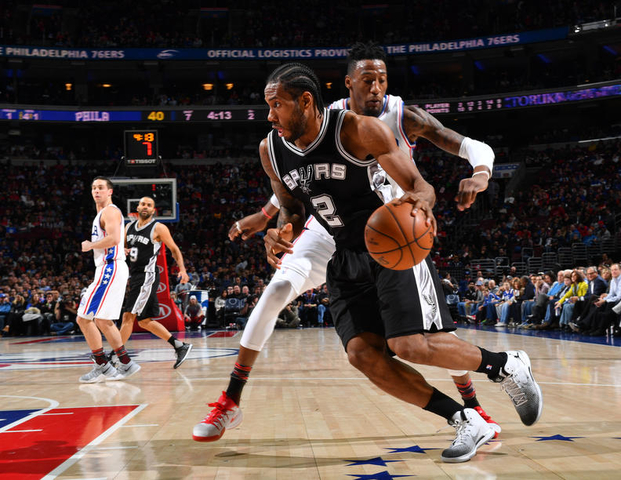
While the All-Star break isn’t technically the halfway point of the NBA season, it generally proves to be a pretty good midway point to stop and reflect on how teams are progressing. Because playoff viability and match-ups are discussed before the season even begins, it is easy to lose sight of the fact that the NBA season is meant to be a process through which teams make adjustments to schemes and lineups.
The San Antonio Spurs, for example, are a different team now than they were back in game one of the season against the Golden State Warriors and will be different still by game eighty-two. Since the Spurs’ standard is to compete for a championship every year, what better standard to compare their performance to this point in the season with the other championship Spurs teams through All-Star break.
1999
Due to a lockout-shortened season, there was no All-Star game in 1999. Instead, figuring that the Spurs have played in about 68% of the games they will play this season, we will look at where the 1999 Spurs were after about 68% of their games as well. At that point in the season, the Spurs had a 24-10 record and had won 18 of their last 20 games. While they did not start their first championship season particularly strong, winning only 6 of their first 14 games, by April 9th (where the hypothetical All-Star break would occur for the Spurs in this season) the Spurs had the fourth best record in the league. They also had a league-best net rating of 9.1, a very good indicator for playoff success. They had the league’s eighth best offensive rating at 101.8 points per 100 possessions (which would rank 28th today) and the best defensive rating at 92.5 pp/100 (which would far and away be the best today). They played with a pace of 91.69 possessions per game, which was very average at the time. These numbers stayed pretty consisted throughout the rest of the season and through their first Final’s victory.
2003
Unlike 1999, 2003 was a regular length NBA season and did feature an All-Star game. The All-Star game itself took place on February 9th, and the Spurs came in to the weekend with a 33-16 record, which was about the fifth best record in the league at the time. They had a net rating of 5.0, a number you would expect out of a strong playoff team, but sixth-best in the league overall. Their offense was somewhat average compared to the other teams at that point in the season, producing an offensive rating of 100.2, sixteenth best in the league. Their effective field goal percentage (or EFG%) ranked fifth in the league at 48.4%, while their defensive rating was second in the league at 95.3. While the 1999 Spurs were putting up dominant stats by this point in the season, the 2003 Spurs weren’t quite producing such numbers. By the end of the season, however, the Spurs were tied for the best record and had improved their net rating to 6.5, third best in the league.
2005
The 2005 All-Star game took place on February 20th, almost two weeks later in the year than the 2003 All-Star game. By this point in the season, the Spurs had a record of 41-12, the best record in the league. Their net rating was also a league-best 12.3. This is an incredibly high net rating and usually indicates a fairly dominant team. For reference, this year’s Warriors have a net rating of 12.3. Their offense was good, but not overwhelming at an offensive rating of 106.5, or sixth in the league. Their defense, however, was incredibly strong, with a defensive rating of 94.2, best in the league by over 2 points. If that Spurs team were to play today, their offense would rank 14th, but their defense would rank 1st by well over 6 points. In terms of pace, the 2005 Spurs embodied the reputation they had the entire decade – slow it down and feed the ball to Duncan in the post. Their pace was 25th in the league at 91.24 possessions per game. Their EFG% was fourth in the league at 50.2%, meaning that despite playing slow, they were a fairly efficient team for the time (that EFG% would rank 20th this season).
2007
The 2007 All-Star game took place on February 18th. The Spurs had the fourth-best record in the league at the time at 35-18. They ranked second in net rating at 7.9. Interestingly, when All-Star weekend occurred in 2007, the Spurs and the Dallas Mavericks had the exact same net rating despite the Mavericks having won 9 more games than the Spurs. Instead, it was the Phoenix Suns who held the best net rating at 8.2. The Spurs’ offensive rating ranked sixth at 105.9 while they shot an efficient EFG% of 51.8%, second best in the league. The Spurs’ defensive rating proved to be strong once again, ranking third overall by the All-Star break, at 98.0. By the end of that season, however, the Spurs had risen in all of these rankings. Most notably, their net rating was a league-best 9.2 despite still having 9 less wins than the Mavericks (who had a net rating of 7.9).
2014
The 2014 All-Star game took place on February 16th, and, coincidentally, was held in New Orleans. By the time All-Star weekend took place, the Spurs had a record of 38-15, good for fourth best in the league. They ranked 3rd in the league in net rating at 7.0, as well. Despite their offensive rating being higher than it had been for any other championship Spurs team through All-Star weekend at 107.4, it ranked seventh best in the league. They were efficient at shooting the ball with an EFG% of 53.9%, second best in the league. Their defensive rating was fifth best in the league at 100.4. Something interesting to note, other than EFG% – through this point in the season, the Oklahoma City Thunder ranked better in all of these metrics than the Spurs. In 2014, the Thunder seemed to be the Western Conference front-runners for much of the season, and many believed the Spurs were too old to match-up with the athletic, young Thunder. By the end of the season, however, after a franchise-best 19 game winning streak, the Spurs ranked higher than the Thunder in each of these metrics and had the best record in the league.
2017
The All-Star game this season is taking place this Sunday, February 19th. Currently, the Spurs have the second best record in the league at 43-13, which is comparable to one of the best records they had by All-Star break in any of their championship seasons. As of now, their net rating ranks second at 9.0, higher than three of their championship seasons by this point in the year. Their offense ranks fifth at 110.0 and their EFG% ranks sixth at 52.9%. Finally, their defense ranks first at 101.0, which despite ranking first in the league is lower than it was by All-Star break during any of the years they won the championship. When comparing the metrics used through-out the article, this season’s Spurs team ranks fairly even across the board with where the Spurs teams that won the championship were by All-Star break. Their net rating is incredibly healthy and their defense has continued to improve as the season has progressed. What this season has that those seasons did not, however, is what may end up being one of the most dominant teams in NBA history in the Warriors, led by their four all-stars. Despite that, the evidence shows that between the All-Star break and the playoffs, there are plenty of opportunities for the Spurs to improve. And based on the Spurs’ records of the past, they almost always do.





